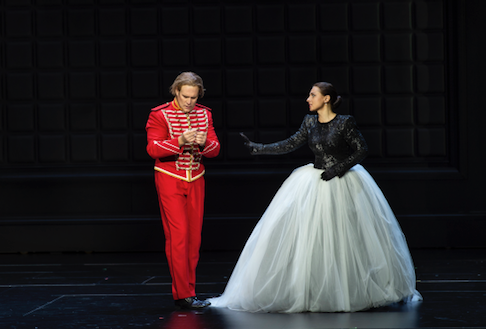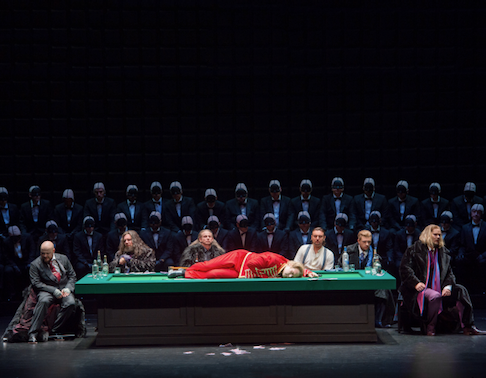![n, Hanna Schwarz as Pique Dame [All photos copyright Ruth Walz, courtesy of the SBrandon Jovanovich as Hermanalzburg Festival]](http://www.operatoday.com/PiqueDame_Salzburg1.png)
16 Aug 2018
Pique Dame in Salzburg
It was emeritus night at the Salzburg Festival with 75 year old maestro Mariss Jansons conducting 77 year old stage director Hans Neuenfels production about Pushkin’s 87 year old countess known as the Pique Dame.
English Touring Opera are delighted to announce a season of lyric monodramas to tour nationally from October to December. The season features music for solo singer and piano by Argento, Britten, Tippett and Shostakovich with a bold and inventive approach to making opera during social distancing.
This tenth of ten Live from London concerts was in fact a recorded live performance from California. It was no less enjoyable for that, and it was also uplifting to learn that this wasn’t in fact the ‘last’ LfL event that we will be able to enjoy, courtesy of VOCES8 and their fellow vocal ensembles (more below …).
Ever since Wigmore Hall announced their superb series of autumn concerts, all streamed live and available free of charge, I’d been looking forward to this song recital by Ian Bostridge and Imogen Cooper.
The Sixteen continues its exploration of Henry Purcell’s Welcome Songs for Charles II. As with Robert King’s pioneering Purcell series begun over thirty years ago for Hyperion, Harry Christophers is recording two Welcome Songs per disc.
Although Stile Antico’s programme article for their Live from London recital introduced their selection from the many treasures of the English Renaissance in the context of the theological debates and upheavals of the Tudor and Elizabethan years, their performance was more evocative of private chamber music than of public liturgy.
In February this year, Albanian soprano Ermonela Jaho made a highly lauded debut recital at Wigmore Hall - a concert which both celebrated Opera Rara’s 50th anniversary and honoured the career of the Italian soprano Rosina Storchio (1872-1945), the star of verismo who created the title roles in Leoncavallo’s La bohème and Zazà, Mascagni’s Lodoletta and Puccini’s Madama Butterfly.
Evidently, face masks don’t stifle appreciative “Bravo!”s. And, reducing audience numbers doesn’t lower the volume of such acclamations. For, the audience at Wigmore Hall gave soprano Elizabeth Llewellyn and pianist Simon Lepper a greatly deserved warm reception and hearty response following this lunchtime recital of late-Romantic song.
Collapsology. Or, perhaps we should use the French word ‘Collapsologie’ because this is a transdisciplinary idea pretty much advocated by a series of French theorists - and apparently, mostly French theorists. It in essence focuses on the imminent collapse of modern society and all its layers - a series of escalating crises on a global scale: environmental, economic, geopolitical, governmental; the list is extensive.
For this week’s Live from London vocal recital we moved from the home of VOCES8, St Anne and St Agnes in the City of London, to Kings Place, where The Sixteen - who have been associate artists at the venue for some time - presented a programme of music and words bound together by the theme of ‘reflection’.
'Such is your divine Disposation that both you excellently understand, and royally entertaine the Exercise of Musicke.’
Amongst an avalanche of new Mahler recordings appearing at the moment (Das Lied von der Erde seems to be the most favoured, with three) this 1991 Mahler Second from the 2nd Kassel MahlerFest is one of the more interesting releases.
‘And there was war in heaven: Michael and his angels fought against the dragon; and the dragon fought and his angels, And prevailed not; neither was their place found any more in heaven … that old serpent … Satan, which deceiveth the whole world: he was cast out into the earth, and his angels were cast out with him.’
If there is one myth, it seems believed by some people today, that probably needs shattering it is that post-war recordings or performances of Wagner operas were always of exceptional quality. This 1949 Hamburg Tristan und Isolde is one of those recordings - though quite who is to blame for its many problems takes quite some unearthing.
There was never any doubt that the fifth of the twelve Met Stars Live in Concert broadcasts was going to be a palpably intense and vivid event, as well as a musically stunning and theatrically enervating experience.
‘Love’ was the theme for this Live from London performance by Apollo5. Given the complexity and diversity of that human emotion, and Apollo5’s reputation for versatility and diverse repertoire, ranging from Renaissance choral music to jazz, from contemporary classical works to popular song, it was no surprise that their programme spanned 500 years and several musical styles.
The Academy of St Martin in the Fields have titled their autumn series of eight concerts - which are taking place at 5pm and 7.30pm on two Saturdays each month at their home venue in Trafalgar Square, and being filmed for streaming the following Thursday - ‘re:connect’.
The London Symphony Orchestra opened their Autumn 2020 season with a homage to Oliver Knussen, who died at the age of 66 in July 2018. The programme traced a national musical lineage through the twentieth century, from Britten to Knussen, on to Mark-Anthony Turnage, and entwining the LSO and Rattle too.
With the Live from London digital vocal festival entering the second half of the series, the festival’s host, VOCES8, returned to their home at St Annes and St Agnes in the City of London to present a sequence of ‘Choral Dances’ - vocal music inspired by dance, embracing diverse genres from the Renaissance madrigal to swing jazz.
Just a few unison string wriggles from the opening of Mozart’s overture to Le nozze di Figaro are enough to make any opera-lover perch on the edge of their seat, in excited anticipation of the drama in music to come, so there could be no other curtain-raiser for this Gala Concert at the Royal Opera House, the latest instalment from ‘their House’ to ‘our houses’.
"Before the ending of the day, creator of all things, we pray that, with your accustomed mercy, you may watch over us."
![n, Hanna Schwarz as Pique Dame [All photos copyright Ruth Walz, courtesy of the SBrandon Jovanovich as Hermanalzburg Festival]](http://www.operatoday.com/PiqueDame_Salzburg1.png)
It was emeritus night at the Salzburg Festival with 75 year old maestro Mariss Jansons conducting 77 year old stage director Hans Neuenfels production about Pushkin’s 87 year old countess known as the Pique Dame.
There were ghosts present — Jansons’ teacher Herbert von Karajan who influenced the design of the Grosses Festspielhaus to favor the Vienna Philharmonic, and Neuenfel’s artistic ancestors — Salzburg Festival founder Max Reinhardt and the surrealist poet/sculptor, Max Ernst — who formed Mr. Neuenfels to be an enfant terrible of a more recent German opera world.
No longer of an age to be thought of as enfant terrible Neuenfels nevertheless is true to form. He did create a truly surreal Pique Dame, its action frozen into multiple tableaux, tableaux that oozed the luxe of Czarist Russia, the austerity of death, the naïveté of love, the joy of sunlight, the frustration of waiting, the anxiety of searching, and so on.
Fixating on the specific mood and atmosphere of each number of Pique Dame (it is very much an old style numbers opera) the heavy pathos of Tchaikovsky’s tormented, obsessed lovers is overlooked, pushed aside to paint the moments of the story. We were no longer able to connect a flow of feeling, thus we were left with no sympathy for Hermann or for Liza. We did have a huge sense of their world.
 Brandon Jovanovich as Hermann, Eugenia Muraveva as Liza
Brandon Jovanovich as Hermann, Eugenia Muraveva as Liza
These atmospheres were gloriously, indeed sumptuously created in Von Karajan’s very present orchestra pit, conductor Jansons urging every possible color from the Vienna Philharmonic, its solo players and its sections creating their unique Vienna tonal world. It was this orchestra beyond compare that riveted us for the multitude of scenes that exposed the soul of the tormented composer Tchaikovsky far more than it involved us in Pushkin’s tale.
Conductor Jansons considers this opera one of the ten finest in the repertory. Though most of us would not agree we surely must appreciate his respect for the piece and for this surely once-in-a-lifetime reading.
The stage setting and costumes were huge in keeping with this orchestral magnitude. Huge gray tufted walls were set upon a black floor laden with conveyor belts used to move fixed battalions of choristers on and off the stage and to allow Hermann to remain stationary while walking, as examples. A proscenium was built into the back wall through which smaller stages were thrust forward for the pastoral performance and as a hospital room the death of the countess. As well the gray surround walls served as a screen for huge projections of storms, city streets and, of course the triumphant face of the pique dame as the production’s final image.
Each chorus number, and there are many, was specifically costumed. There were possibly one hundred choristers, dressed first as fantastically breasted Mother Gooses, keepers of the possibly 50 children chorus who arrived in cages. The choristers became bathers, then donned rain gear when the weather changed, wore party dress for the engagement scene, skeleton costumes, elaborately bustled black dresses, and the men in tuxedos for the final card game.
It was extravagant, overpowering, expensive costuming.
If the elaborate costuming of the choruses illustrated the various exotic tableaux, the principles remained rather plainly and simply dressed in their anguish. Lisa was in simple, contemporary black and white attire, the Pique Dame wore a bizarre short-shirted, pink and green concoction, clothing she shed as she slowly died.
Hermann, the obsessed gambler, masterfully enacted by American tenor Brandon Jovanovich, was from beginning to end a toy soldier in an unbuttoned red uniform. Beautifully sung through the tortured twistings of his obsessive love of Liza and his obsessive quest of the Pique Dame’s three cards (not to discount the oblique, obsessive goals of the production) he was indeed an operatic soldier of impressive magnitude.
 The death of Hermann, plus all named male characters
The death of Hermann, plus all named male characters
Mr. Jovanovich’s heated performance was in contrast to the distant involvement of Russian soprano Eugenia Muraveva as Liza. Mlle. Muraveva is an excellent singer of elegant presence and great reserve. Both Tchaikovsky’s Liza, and last summer’s Lady Macbeth of Mtsensk (that befell her when Nina Stemme fell ill) are well beyond her histrionic range.
The Countess aka Pique Dame was portrayed by 75 year-old, once mezzo Hanna Schwarz who brought little old lady confusion to this role usually taken by old divas of important presence. Mme. Schwartz delivered her death aria in a thin, dying voice, pathetic rather than moving, a performance well in keeping with the emotional void generated by the Neuenfels production.
The more direct and satisfying performances came from Russian male voiced imports — baritone Igor Golovatenko as Liza’s intended Prince Yeletsky, baritone Vladislav Sulimsky as Count Tomsky, bass Stanislavsky Trofimov as Surin, tenor Pavel Petrov as Chaplitsky, bass Gleb Peryazev as Narumov, and tenor Alexander Kravets as Chekalinski.
Equally impressive were the Russian female voices that completed the cast, Oksana Volkova as Polina, Margarita Nekrasova as the governess, Vasilisa Berzhanskaya as Mascha, and Yulia Suleimanova as Prilepa.
Michael Milenski
Production information:
Sets: Christian Schmidt; Costumes: Reinhard von der Thannen; Lights: Stefan Billiger
Grosses Festspielhaus, Salzburg, August 13, 2018.